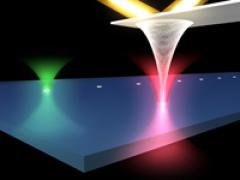 The Molecular Biophysics Program at the University of Colorado, jointly sponsored by NIH and CU, is a collaborative effort involving students, postdocs and faculty from five departments on the Boulder campus. Participants share a common interest in biological systems, and seek to understand these systems in terms of physical and chemical principles. The breadth of the program arises from 40+ affiliated laboratories in the Departments of:
The Molecular Biophysics Program at the University of Colorado, jointly sponsored by NIH and CU, is a collaborative effort involving students, postdocs and faculty from five departments on the Boulder campus. Participants share a common interest in biological systems, and seek to understand these systems in terms of physical and chemical principles. The breadth of the program arises from 40+ affiliated laboratories in the Departments of:
 Each of these departments is among the nation's best in its field. The Biophysics training faculty include one Nobel Laureate, four members of the National Academy of Sciences, and five HHMI affiliates. Acknowledging the strength of the Biophysics community in Boulder, the National Institutes of Health in 2002 formally established the University of Colorado Molecular Biophysics Training Program as one of its sponsored programs. NIH/NIGMS funds, together with matching funds provided by the University of Colorado, enable our program to award training fellowships annually to selected graduate student participants, as well as to support an array of courses, seminars, supergroups, career lunches and other activities sponsored by the training program. Note that all interested students, postdocs and faculty are encouraged to participate in the program, even if their funding is from other sources.
Each of these departments is among the nation's best in its field. The Biophysics training faculty include one Nobel Laureate, four members of the National Academy of Sciences, and five HHMI affiliates. Acknowledging the strength of the Biophysics community in Boulder, the National Institutes of Health in 2002 formally established the University of Colorado Molecular Biophysics Training Program as one of its sponsored programs. NIH/NIGMS funds, together with matching funds provided by the University of Colorado, enable our program to award training fellowships annually to selected graduate student participants, as well as to support an array of courses, seminars, supergroups, career lunches and other activities sponsored by the training program. Note that all interested students, postdocs and faculty are encouraged to participate in the program, even if their funding is from other sources.
The Biophysics program strives to promote and support diversity, inclusion and collaboration among students and faculty. We actively foster a collegial community of people from diverse backgrounds whose complementary experiences and perspectives strengthen and broaden our research, teaching and learning. Our efforts are bolstered by CU Boulder's forward-looking initiatives promoting diversity, inclusion and a caring community based on mutual respect and cooperation.
For doctoral students, the Molecular Biophysics Graduate Training Program provides strong theoretical and experimental foundations in the cross-disciplinary approaches of modern biophysics. The principal offerings of the training program include:
- NIH and CU fellowships to support doctoral studies in biophysics
- An integrated training environment for doctoral students
- Interdisciplinary courses in molecular biophysics
- Biophysical supergroup meetings and seminar series
- Cross-disciplinary advising by teams of faculty mentors
- Professional skills training and experience
- Career development activities and support
- Training in the responsible conduct of rigorous and reproducible research
- Participation in a collaborative, welcoming biophysics research community
- Graduate Certificate in Molecular Biophysics
This website contains information about the departments, laboratories, faculty, and trainees participating in the program; the sponsored courses and seminars offered; the Graduate Certificate in Molecular Biophysics; the available biophysical instrumentation; the campus environment and resources; and graduate admissions.






